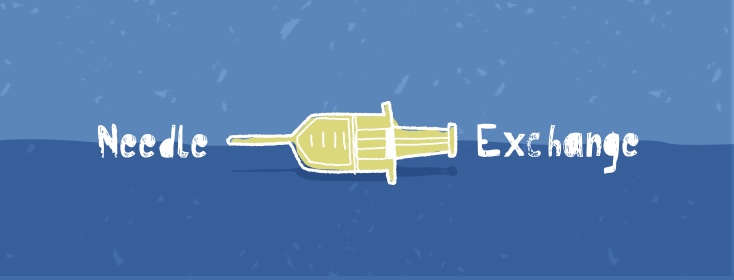Needle Exchange
Needle exchange is a controversial program in which new syringes and other sterile paraphernalia are traded for used injection materials. It is part of the larger philosophy of harm reduction. Needle exchange programs are controversial because many people in government, healthcare, and the general public believe that offering clean syringes to drug users results in more drug abuse. Even though Indiana Governor Mike Pence of Indiana subscribes to this notion, he instituted a time-limited emergency needle exchange program in Scott County, home to the March, 2015 HIV/HCV epidemic. He did so at the urging of the CDC. Needle exchange doesn't create more drug users, but without needle exchange, more people will become infected.
With the national blood supply now cleared of HCV, nearly all new infections occur within the injection drug user community. The primary goal of harm reduction is twofold:
- To reduce the number of HIV and hepatitis C infections within the injection drug user community.
- To dramatically reduce healthcare costs.
- Provide education, awareness, and rehabilitation programs to ultimately reduce the number of people shooting their drugs.
Daniel Raymond, Policy Director for the Harm Reduction Coalition says that new AIDS and hepatitis C infections are now being substantially reduced through needle exchange/harm reduction programs, especially when used as an early intervention in any HIV/HCV outbreak. He says that the need for harm reduction/needle exchange is fueled by our current opioid epidemic. Folks with sports injuries and back pain were prescribed drugs like percocet, vicodin, and Oxycontin. If doctors discontinue these drugs, or if patients take more than prescribed, their first choice often is to try and get these drugs from an illegal source. As with Oxycontin, people discover their drug is more powerful if crushed and snorted, or injected. These drugs can become extremely expensive, so some people turn to a much cheaper, even more powerful drug: heroin.
As with many programs that serve the underserved, there is public opinion against helping these folks – a belief that they don't deserve it because of a perception of injecting drugs as morally reprehensible behavior. Advocates all over the country are working to establish or enlarge needle exchange programs in every state. In their 2012 survey, the North American Syringe Exchange Network (NASEN) identified 203 exchange locations in 34 states, the District of Columbia, Puerto Rico, and the Indian Nations.
In many states, needle exchange is limited to one location in that state's largest city, but with a growing population of injection drug users appearing in poor suburbs across the nation, the challenge is to quickly reduce the number of new cases of HIV/HCV. Injection drug users who seek help are often victims of social stigma and denied anonymity – punished instead of cared for. They are often required to register at a county health department, or to obtain a prescription, with both doctors and pharmacists given the power to deny them sterile syringes. Some drug users who do obtain sterile needles are known to share them with other drug users. In some states, this is a criminal offense. Those who possess clean syringes without a prescription or registration card may face arrest and possible jail time on paraphernalia charges. The surprise is that these are not all “street people” who face opioid addiction. Many of these folks are “functional addicts.” They have jobs, and lead normal lives, except for their dependence on narcotics.
According to their website, the American Medical Association “strongly encourages state medical associations to initiate state legislation modifying drug paraphernalia laws so that injection drug users can purchase and possess needles and syringes without a prescription and needle exchange program employees are protected from prosecution for disseminating syringes.”
With the AMA, CDC, and the NIH supporting needle exchange, it would seem the experts would override backward thinking about these programs. The problem is that the federal government is currently disallowed from spending money on needle exchange. This is a head-in-the-sand approach to the real problem: A public health crisis.
Find needle exchange near you at North American Syringe Exchange Network
Need help now? Check out our resources page!

Join the conversation